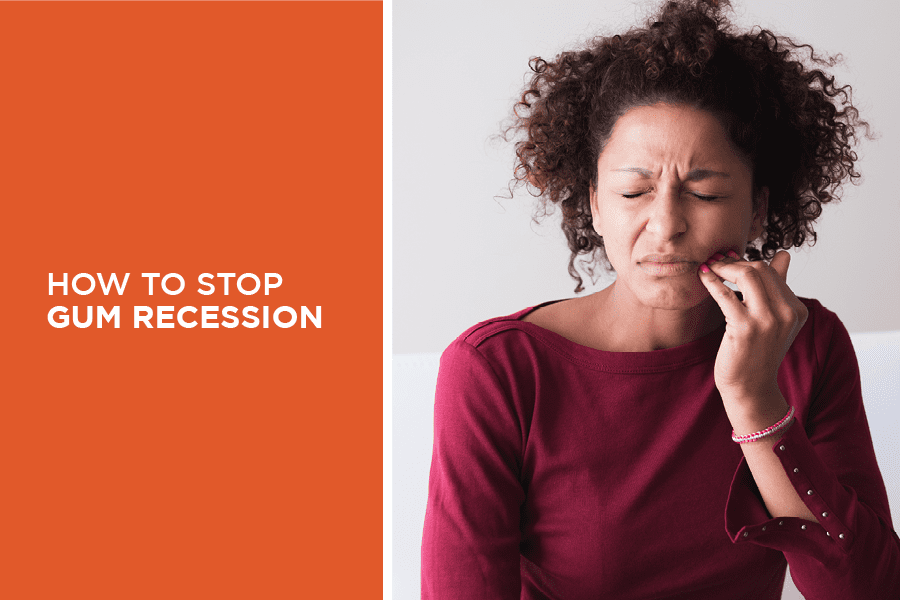How to stop gum recession

Gum recession can affect anyone – even those who follow excellent oral health habits. Factors like age and genetics play a part in this, which is why it’s essential to know what you can do to stop gum recession.
Although you can’t reverse gum recession and its effects, there are things you can practice if you’re curious about how to stop gum recession from worsening.
What is gum recession?
Gum recession is a form of gum disease in which gum tissue pulls away from the teeth, revealing the tooth’s root. Like other forms of gum disease, gum recession can result from poor oral health, making you more prone to cavities and a higher risk of tooth loss. According to Cleveland Clinic, “gum recession can be mild, moderate, or severe. It may affect one tooth or multiple teeth.”
Symptoms of gum recession
Most people with gum recession can identify the condition by visibly seeing the tooth’s root. However, according to Healthline, other symptoms of receding gums include:
- Bleeding after brushing or flossing
- Red, swollen gums
- Bad breath
- Sensitivity or pain at the gum line
- Visibly shrinking gums
- Loose teeth
Causes of gum recession
Individuals over the age of 65 are most likely to develop gum recession. However, certain things can cause it in your younger years. It can be your routine, the presence of certain diseases, or even a combination of both. Partaking in certain health habits may put you at higher risk of developing gum recession, including:
- Aggressive brushing
- Tobacco use
- Plaque or tartar buildup from poor oral health habits
Although poor oral hygiene is one of the most common causes of gum recession, certain pre-existing conditions can also be contributing factors, such as:
- Periodontal disease
- Diabetes
- Immunocompromised disease
- Genetic history
- Dry mouth
Depending on the severity of the gums, nonsurgical and surgical treatments can help if you’re wondering how to stop gum recession.
Nonsurgical treatments for gum recession
Although it’s impossible for receding gums to grow back, there are nonsurgical treatments that can help halt any recession and reduce the appearance.
- Root scaling and planing: Your dentist may recommend root scaling and planing procedures to remove plaque buildup and reduce the presence of bacteria on the gums.
- Dental bonding: Dentists can use a tooth-colored composite resin to help camouflage the recession area, hiding the recession and making it more comfortable for you.
- Natural remedies: Various studies find that oil pulling, aloe vera applications, and the use of essential oils contain antiplaque and antigingivitic properties.
Surgical treatments for gum recession
If you’re looking for a long-lasting treatment, your dentist or periodontist may recommend a gum graft surgery. During this procedure, a gum graft replaces the missing gum tissue by taking other tissue from various parts of your mouth. There are many different types of gum grafts, and your dentist will help you decide which is best for you and your situation:
- Connective tissue graft: Skin is taken from the roof of your mouth and tissue from under the flap.
- Free gingival graft: Tissue is taken only from the roof of your mouth.
- Pedicle graft: If possible, tissue is taken from the gums surrounding the affected area.
Although components like aging and genetics can play a part in the likelihood of developing gum recession, the best thing you can do to keep your gums healthy is to maintain a proper oral care routine. Brush and floss twice daily and visit the dentist regularly for routine cleanings and check-ups. If treatment is needed, discuss any of the options above with your dentist.
Related stories
-
Oral Health Advantages to Practicing Yoga
The practice of yoga is on the rise. 36 million Americans regularly roll out their mats to … Read More
-
Periodontal, Gum Disease Attacks the Whole Body
It wasn’t long ago that the connection between oral health and overall health seemed distantly related at … Read More
-
How Silver Diamine Fluoride Can Protect Your Teeth
*Updated January 2024 Did you know that Delta Dental of Wisconsin offers silver diamine fluoride coverage with … Read More
Sign Up Now
Most Liked
- 1 Do Expiration Dates on Dental Products Matter? 305 Likes
- 2 Is Activated Charcoal Safe for your Smile? 166 Likes
- 3 Crazy and Cool Fish Teeth Facts 91 Likes
- 4 Delta Dental Protects Your Eyes with DeltaVision® Coverage 70 Likes
- 5 The In-between Tooth: Guide to Bicuspids 53 Likes
- 6 Recipe: Quick Pumpkin Pudding 49 Likes
- 7 Bad Taste After Brushing? Common Explanations 44 Likes
- 8 People with Dental Benefits are Healthier 39 Likes
- 9 Own Your Oral Health: Subscribe now for tips to ensure a bright smile 38 Likes
- 10 Signs of diabetic eye problems 36 Likes




